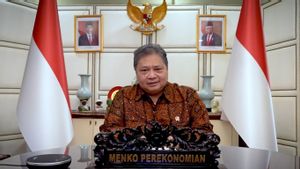JAKARTA - The World Bank said small companies dominate the private sector in Indonesia. However, it makes a small contribution.
"Only a few large companies dominate the market, while most companies remain small and less productive," World Bank's Senior Private Sector Specialist Alexandre Hugo Laure quoted Antara as saying.
Alexandre explained that the private sector in Indonesia is characterized by many small companies, but the economic dominance is that there are only a few large companies.
The private sector in Indonesia is very large, with 66 million business entities, and 9 million of them registered officially.
The group consists mostly of micro, small and medium enterprises (MSMEs), with a significant presence in the wholesale and retail sector (54 percent), accommodation and food services (20 percent), and the processing industry (14.5 percent).
On the other hand, in terms of size, the dominance of large companies that last a long time distinguishes Indonesia from other countries such as India, Mexico, the Philippines, and Turkey.
"These big industrial companies have played an important role in Indonesia's development but have recently begun to show a slowdown in productivity growth," he said.
Compared to the economy of India, Mexico, the Philippines, and Turkey, in Indonesia, small companies dominate the company's population. Small companies cover 56 percent of companies. Small companies make small contributions to output. Small companies generate 3 percent of the total output
Small companies produce few jobs. Small companies employ 11 percent of full-time workers. Small companies are not connected to the international market. Less than 2 percent of small companies use imported raw materials or supplies.
Furthermore, Alexandre said reforms to improve the development of the private sector had been carried out, but the regulatory and productivity gap was still there.
Indonesia has been traveling transformatively since 2015, by implementing significant economic reforms to improve the business environment.
Reforms such as the Omnibus Law on Job Creation in 2020 and ease of investing have resulted in real progress. In particular, the implementation of the Online Single Submission (OSS) system has harmonized the registration and business licensing process, thus significantly easing the operational burden on the business world through the application of a risk-based approach.
SEE ALSO:
On the other hand, increasing regulatory consistency and encouraging access to international markets is the key to issuing the potential of the Indonesian private sector and encouraging sustainable economic growth.
Meanwhile, to encourage access to international markets, easing access to global markets can increase the competitiveness of Indonesian companies and make big companies more productive.
Policies that integrate local companies into global value and supply chains require increased environmentally friendly technology, management, and production.
In the future, Indonesia is expected to create a more dynamic and resilient private sector that can encourage long-term economic growth and improve the quality of life of its people.
The English, Chinese, Japanese, Arabic, and French versions are automatically generated by the AI. So there may still be inaccuracies in translating, please always see Indonesian as our main language. (system supported by DigitalSiber.id)
















